What to Do If Your Facebook Account Has Been Cloned
Indeed, Facebook cloning is not a new phenomenon; it has been happening for many years. A Facebook survey found that between 2015 and 2019, around 16% of all accounts were either fake or duplicated. And this percentage continues to rise by the year.
If you suspect your Facebook account has been cloned, don't fret. Below is a simple guide on how to tell that and what to do if your Facebook profile is cloned. Let's get started!
Understanding Facebook Account Cloning
Facebook account cloning is the process whereby a fake profile is created by copying someone's name, photos, and personal information. The primary reason why people clone Facebook accounts is to deceive or scam people.
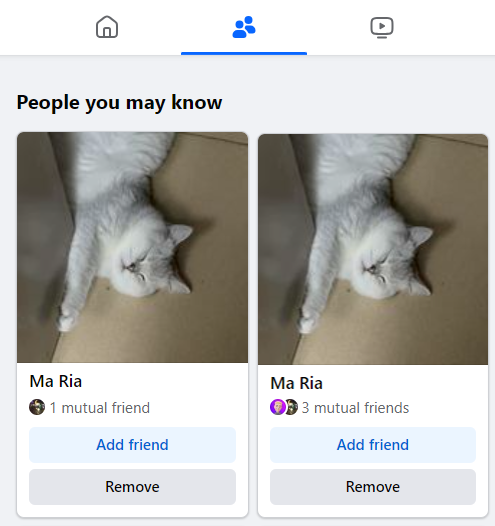
Due to this, you might think a Facebook cloned account is similar to a hacked one. Here are some differences between Facebook cloning and Facebook hacking:
Although both cloning and hacking aim to scam or steal information from the victim's contacts, they differ significantly in how they operate.
While Facebook cloning only involves creating a fake profile that mimics someone's account, Facebook hacking involves gaining unauthorized access to the victim's actual account, allowing direct control over the account data and activities.
Moreover, Facebook cloning requires few technical skills, unlike Facebook hacking, which may require malicious techniques like malware and spyware installation, brute-force attacks, password reset exploitation, and many more.
How to Verify if Your Facebook Account Is Cloned
Before taking back control of your Facebook account from that clone one, let's check how you can verify that your Facebook account has been cloned:
Investigate it by Yourself
You can easily verify if your account is cloned by conducting a thorough investigation yourself. To do this, use the Facebook search bar to look for an account with your name. If the account is using your profile picture and information that are peculiar to you, then your Facebook account has been duplicated.
To simplify the process, you can also use reverse image search tools like Google Image. This tool helps you verify if your personal photos are used on other websites or accounts without your permission.
Through a Friend
Cloners don't duplicate accounts for fun; they do it to scam your friends and contacts. If your friends start telling you they're receiving messages from you, but that is not your actual account, it's a strong indication that your account has been cloned. Similarly, if they mention receiving friend requests from a new account pretending to be you, it's another clear sign of cloning.
What to Do If Your Facebook Account Is Cloned
After confirming that your Facebook account has been cloned, don't panic - here's what to do immediately and how to prevent Facebook cloning in the future.
1Report the Cloned Account
Facebook states that impersonating other people goes against their Community Standards, which is not allowed. Therefore, it encourages users to report the cloned profiles or pages.
By doing that, such accounts will be permanently removed after being reviewed by Facebook. Reporting a cloned Facebook account is very simple. Here's how to get started.
- Step 1.Login to your Facebook account on your web browser or app.
- Step 2.Go to the cloned profile and click on the three dots.
- Step 3.Press "Report Profile" from the dropdown menu.
- Step 4.Select "Pretending to someone." You'll be asked who the account is pretending to be.
- Step 5.Just choose the appropriate option and tap "Submit" to finish the process.
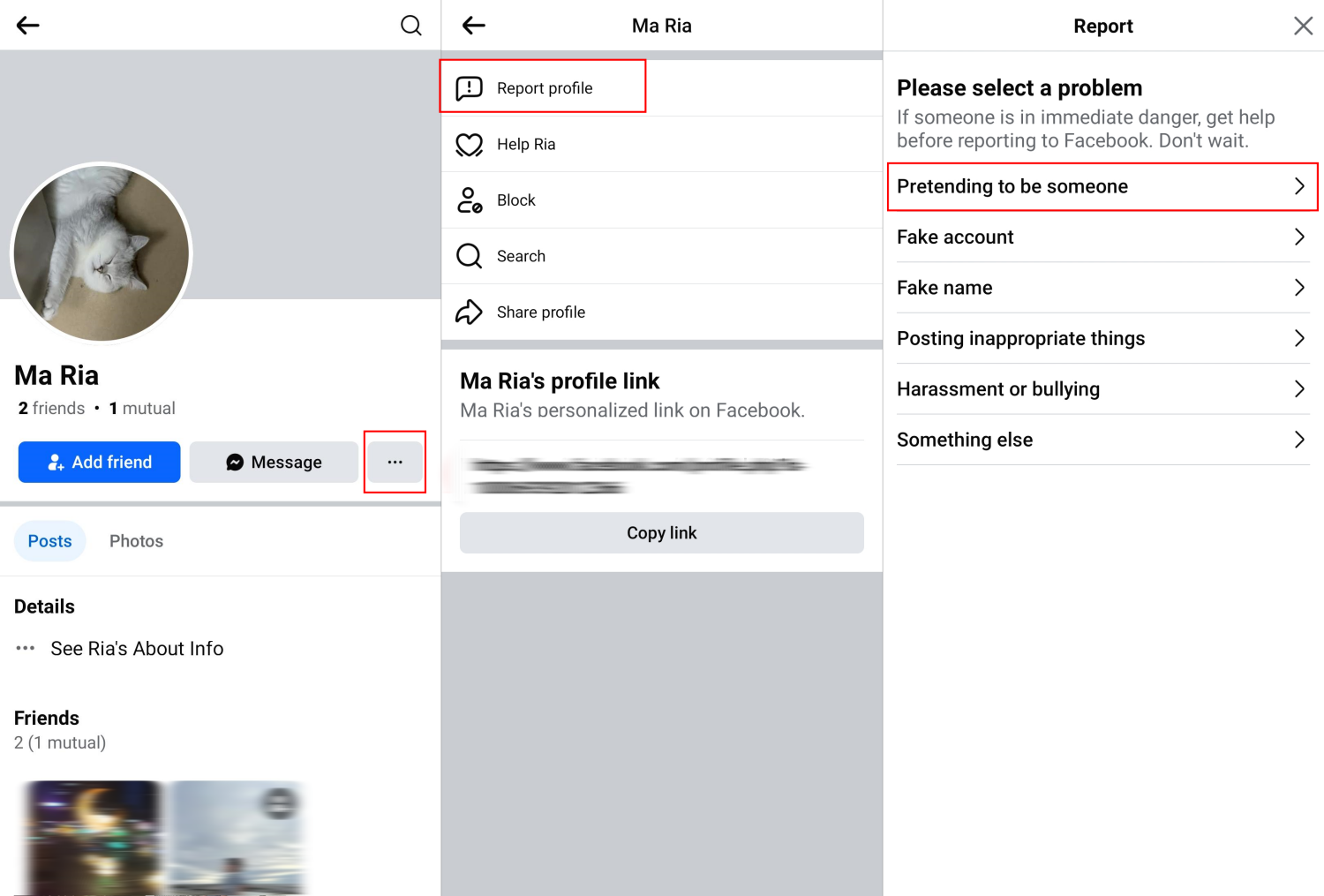
2Inform your Facebook Friends
Once you notice your account has been cloned, notify your friend about an account impersonating you by creating a public post or sending private messages to them. When you do this, your friends will be aware of the cloning, and any attempt by the cloner to scam them will be foiled.
3Lock Your Facebook Profile
By making your Facebook profile private, cloners won't have access to some sensitive information on your account, which probably prevents them from impersonating you.
Once you lock your profile, only your friends can see your full profile, including posts, photos, and stories, while others can only see up to 5 details from your profile. Follow the steps below to learn how to lock your Facebook profile.
- Step 1.On Facebook, open your own profile page.
- Step 2.Click on the "..." button below your name.
- Step 3.From the dropdown menu, select "Lock Profile."
- Step 4.Press "Lock Your Profile" to complete the process.
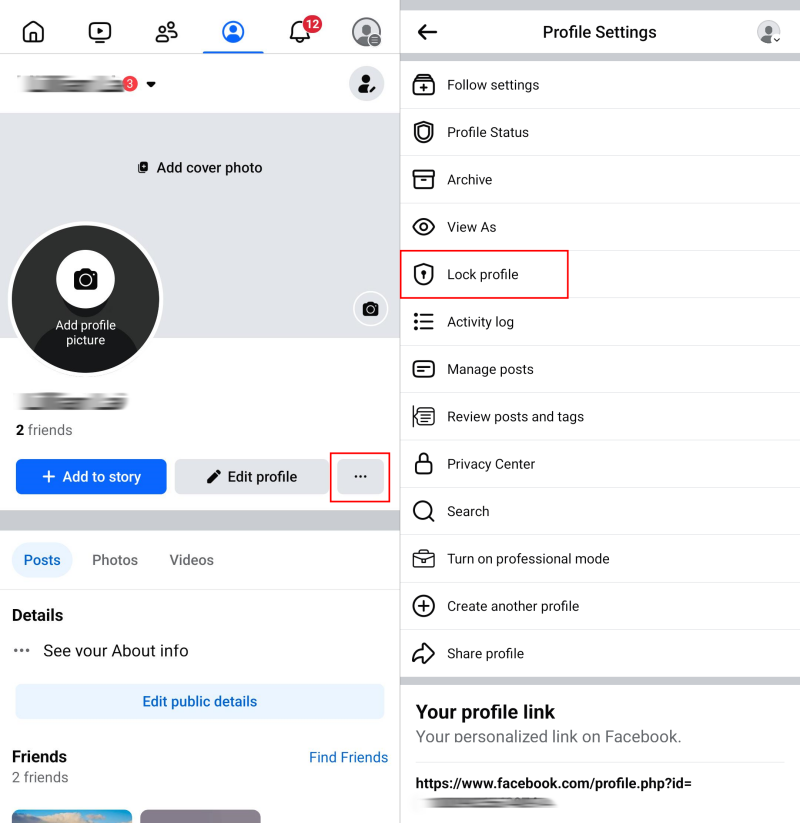
Kindly note that the "profile locking" feature is not available in all countries.
4Hide Your Friend List
Except you set your contact list to public or friend to friends, cloners can't have access to your friends. So, hiding your friend list makes it difficult for cloners to find a target, which deters them to clone your account to some extent. If you're willing to hide the contact list, follow the steps below.
- Step 1.Go to the Facebook "Settings."
- Step 2.Tap on "How people find and contact you" under "Audience and visibility."
- Step 3.Locate "Who can see your friends list" and select "Friends" or "Only Me."
- Step 4.Under this section, you can also increase your privacy level by adjusting who Facebook can suggest your profile to.
Is it Necessary to Fight Against Facebook Cloned Accounts?
Absolutely yes. Once you discover your Facebook account has been cloned, you must find every means to fight against it. Otherwise, the cloned Facebook account can lead to the following issues:
Scams
Once your Facebook account is cloned, an exact copy of your profile is created, and the cloner can access your friend list if it is set to public. This allows the cloner to message your Facebook contacts directly while pretending to be you. Then, the clone will begin to ask for financial help or loans by claiming to be in an emergency.
Reputation Damage
If you leave a cloned Facebook account unchecked, it can seriously harm your reputation. Imagine your name being used to falsely request loans or sell products without delivering them— that could be demeaning, isn't it? Some cloners may even go as far as using a cloned profile to spread fake news or explicit content that can further damage your reputation.
Personal Information Theft
Once cloners start having access to a cloned Facebook contact, they will begin to send some malicious links that are capable of exposing their personal information to unscrupulous actors.
Bonus: Check If Your Child is Interacting With Cloned Account
The people behind cloned Facebook accounts sometimes target younger audiences because they typically have less life experience and cognitive ability to recognize deceptive practices.
So, this can be highly risky to children if your child is interacting with a cloned account on Facebook. It can lead to financial scams, grooming and exploitation, emotional trauma, and much more.
To prevent this risk, start by educating your child about Facebook cloning and how to identify it. You can also set up AirDroid Parental Control on your kid's phone to add an extra layer for their safety.
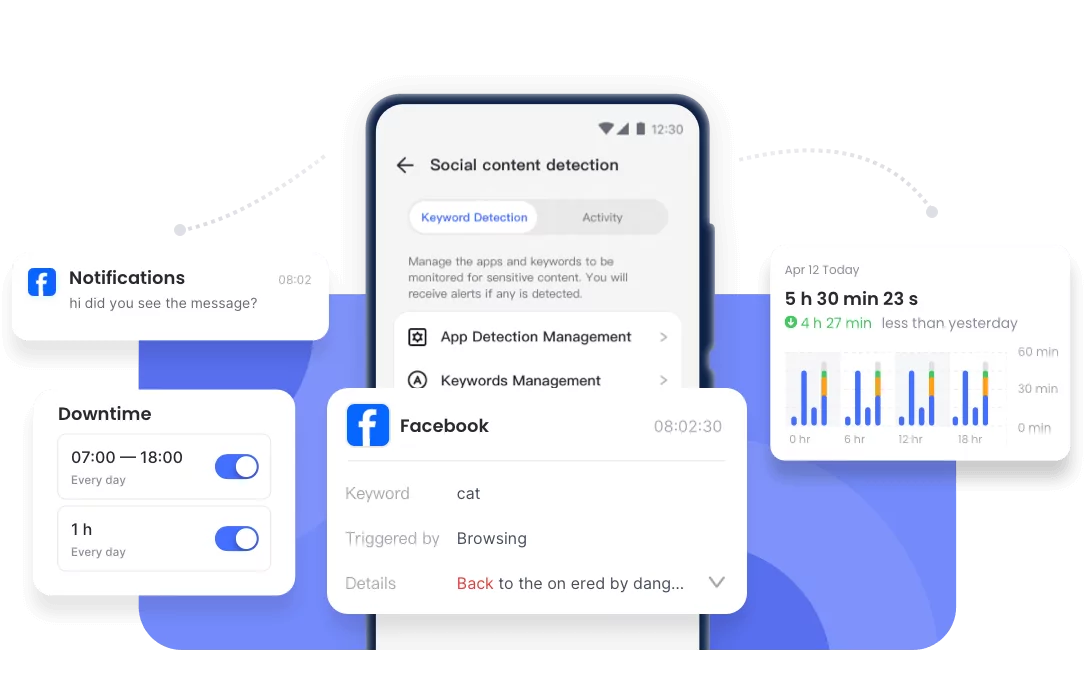
AirDroid cannot only sync what messages come to your child's Facebook but also quickly send alerts to you if it detects inappropriate words on your child's social media platforms, including Facebook. Are you interested in getting started with AirDroid? If yes, try it free now.
Conclusion
Just like a hacked Facebook account, a cloned Facebook account can pose significant risks. It can lead to data harvesting, damage your reputation, and cause financial loss.
Once you notice a cloned profile, the best course of action is to report it, inform your friends, and lock your profile. This way, you leave the cloner confused and unable to continue their schemes. To safeguard your little ones from these cloned accounts, feel free to try AirDroid Parental Control.



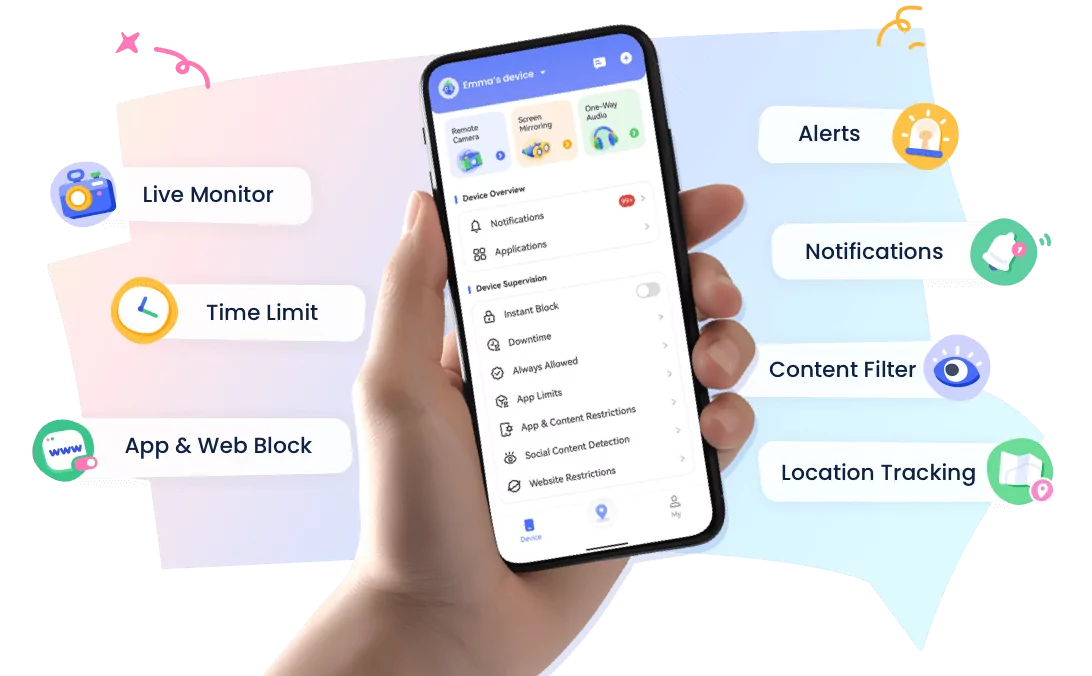









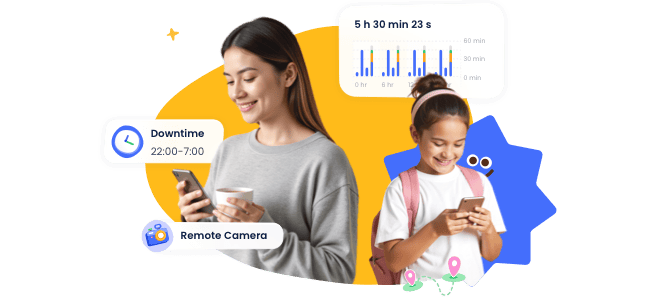
Leave a Reply.